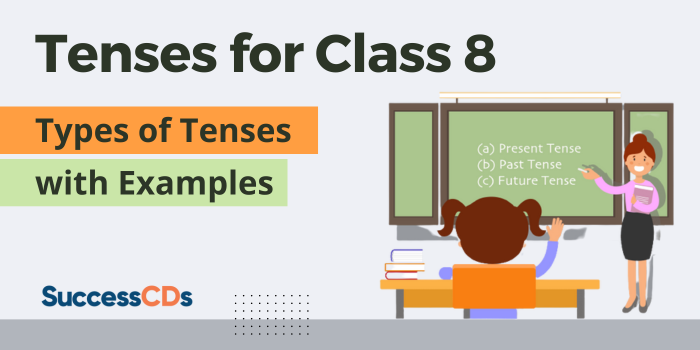
CBSE Class 8 English Grammar Topic “Tenses”
Tenses for Class 8 – Every student of English Grammar must know the concept of Tenses. For class 8 students, tenses are a part of their syllabus. Here we have listed down all the details of the topic of tenses, examples have been added and a practice exercise for Class 8 Students at the end helps you to test your knowledge.In case you wish to score 100 percent in English Grammar, you can have a look at our English Grammar Course
So lets start studying.
Firstly, let us know what do we mean by the term Tenses
Tense indicates the time of the action or a state of being in the past, present or future. This means that tenses are such indicators which tell us when an action was done.
Types of Tenses
Tenses are broadly classified into three types-
- Present tense
- Past tense
- Future tense
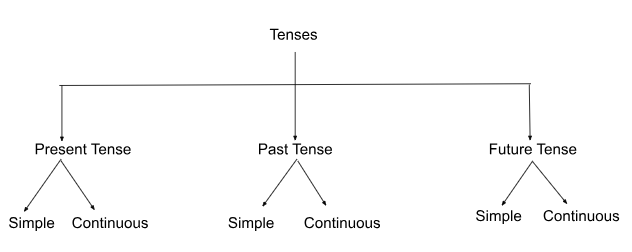
Let us see what the three types of tenses denote-
- The present tense is used to refer to an action or state of being at the time of speaking.
- The past tense expresses an action that has already taken place or refers to a state of being that existed before the time of speaking.
- The future tense refers to a state of being or an action that is expected at a certain time in the future.
These tenses can be further classified into 4 types each, as follows-
- Simple / indefinite
- Continuous
- Perfect
- Perfect continuous
These denote the stage at which an action is.
For example –

For class 8, we require the detailed understanding of the first two types i.e. Simple and continuous. Let us understand the finer details of these two subsets of tenses-
Simple Present / Present Indefinite Tense
The simple present tense is used to show a habitual action, to express a universal truth and to express an action that takes place at present or at the time of speaking.
Let us look at some examples
1. He reads the newspaper daily
2. All the planets of the solar system revolve around the sun.
3. Rita plays near the swings.
Rule for framing a sentence in Present indefinite tense –
Subject + verb (s / es form) + object.
Present Continuous Tense
The present continuous tense is used to indicate an action which is still going on at the time of speaking and to talk about such a work which is ongoing but may not be going on at the time of speaking, to refer to a definite plan in future.
Let us look at some examples-
1. The boy is playing here.
2. I am attending yoga classes these days.
3. She is buying a car next week.
Rule for framing sentence using present continuous tense-
Subject + is / am / are + verb (‘ing’ form) + object.
Simple Past / Past Indefinite Tense
The simple past tense is used to express a past habit, to express an action that was completed before the time of speaking and to narrate a story.
Let us look at some examples-
1. I went to bed early.
2. The dancers performed well.
Rule for framing sentence in past indefinite tense-
Subject + verb (past form) + object.
Past Continuous Tense
The past continuous tense is used to express an action going on at sometime in the past and to indicate an action which had started at some time but had not ended at the time when some other action took place.
Let us look at some examples-
1. She was knitting a jersey.
2. The lady was coughing when I entered the room.
Rule for framing sentence in past continuous tense-
Subject + was / were + verb (‘ing’ form) + object.
Simple Future Tense
Will and shall is used with verbs in the simple future tense to express an action which will take place in future and to express planned or intended action in future.
Let us look at some examples-
1. People will support the fight against corruption.
2. I will pick up my friend in the afternoon.
Rule for framing sentence in future indefinite tense-
Subject + will / shall + verb (base form) + object.
Future Continuous Tense
The future continuous tense is used to indicate an action that will be going on in future and to refer to a pre-scheduled future plan.
Let us look at some examples-
1. She will be joining a coaching centre for tuition.
2. The manager will be meeting the new clients on Monday.
Rule for framing sentence in future continuous tense-
Subject + will / shall + be + verb (‘ing’ form) + object.
In order to form the right sentences, we must know the different forms of verbs i.e. base form, s/es form, past form, present participle form and past participle form.
There are actually five different verb forms in English grammar which are as follows-
1. Present (Root) form of a verb
I love watching movies with my friends. (Root verb – love)
2. Third -person singular Present form
Tom likes having cereal for breakfast. Root verb – like, Third person singular form – likes
3. Simple Past form of a verb
Jump – Jumped
4. Present Participle form of verb
Run – Running
5. Past Participle form of a verb
Root verb- Think, Simple Past- Thought, Past Participle- Thought
Regular and Irregular Verbs
A regular verb is a verb that follows a common pattern of conjugation. The past tense of a regular verb is formed by adding an ‘ed’ or ‘d’ to the root verb and the past participle form of the verb is the same as its past form.
Regular Verb- Accept
Simple Past Form of the Verb- Accepted
An irregular verb is defined as “a verb that does not follow the usual rules of grammar. For example, ‘eat’ is an irregular verb because its past tense is ‘ate’ and its past participle is ‘eaten’, not ‘eated’,” according to the Macmillan Dictionary. According to the Oxford Learners’ Dictionary, an irregular verb is a verb that is “not formed in the normal way.” The normal way of forming past and past participle forms of a verb in English is by adding ‘ed’ to it. Irregular verbs do not follow this rule.
Here is a list of commonly used regular verbs and their 5 forms
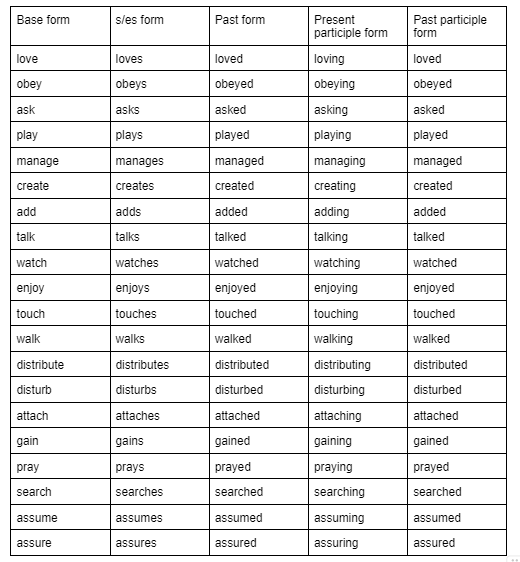
Here is a list of commonly used irregular verbs and their 5 forms
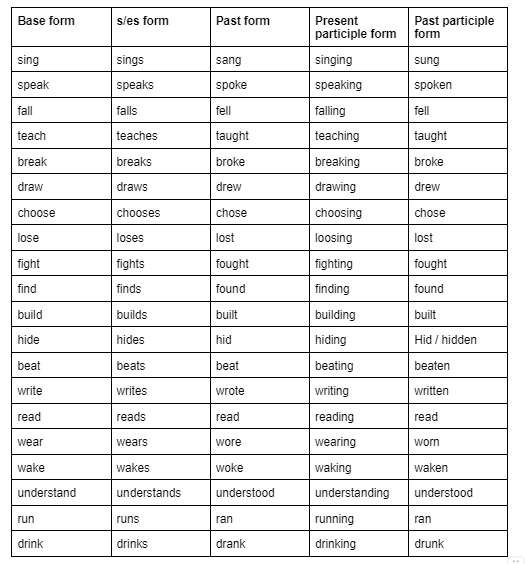
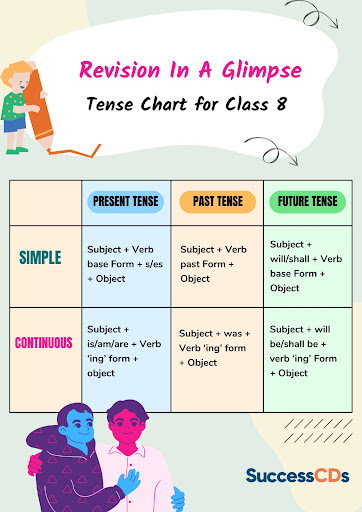
Exercise on Tenses for Class 8 Students (Practice Questions)
Fill in the blanks with the correct verb form-
1. The director is ____________ (visit) our school tomorrow. (present tense)
2. He _______________ (enjoy) paneer tikka. (present tense)
3. She is ____________ (go) to Maldives next week. (present tense)
4. Bengalis ________________ (celebrate) Durga Puja with great fervour. (present tense)
5. Meenal ____________ (complete) her homework. (present tense)
6. She ___________ (snore) all night. (past tense)
7. I ___________ (wake) early when I was in school. (past tense)
8. Mayank ____________ (play) till 4 in the evening yesterday. (past tense)
9. I _____________ (work) in a company for 10 years. (past tense)
10. My brother __________ (sleep) when I entered his room. (past tense)
11. The kids ___________ (sing) really well in the annual function. (past tense)
12. The scheme ____________ (launch) next month. (future tense)
13. Sohan ______________ (study) when you reach home. (future tense)
14. I _____________ (consult) a specialist for my eye problem. (future tense)
15. She _____________ (join) sewing classes. (future tense)
16. I ____________ (make) a cup of coffee for the guests. (future tense)
17. ____________ (lay) the table for dinner? (future tense)
18. She ___________ (visit) her ailing grandfather soon. (future tense)
19. I _____________ (leave) for Bombay tonight. (future tense)
20. My mother __________ (cook) italian for dinner. (future tense)
Answers
1. The director is visiting our school tomorrow.
2. He enjoys paneer tikka.
3. She is going to Maldives next week.
4. Bengalis celebrate Durga Puja with great fervour.
5. Meenal completes her homework.
6. She was snoring all night.
7. I woke up early when I was in school.
8. Mayank was playing till 4 in the evening yesterday.
9. I worked in a company for 10 years.
10. My brother was sleeping when I entered his room.
11. The kids sang really well in the annual function.
12. The scheme will launch next month.
13. Sohan will be studying when you reach home.
14. I will consult a specialist for my eye problem.
15. She will be joining sewing classes.
16. I will make a cup of coffee for the guests.
17. Shall I lay the table for dinner?
18. She will visit her ailing grandfather soon.
19. I will be leaving for Bombay tonight.
20. My mother will cook italian for dinner.
Fill in the blanks with a suitable option-
A. A moth, an insect _______ (1) to the butterflies. There ________(2) about 150,000 to 250,000 different _________(3) of moth (about 10 times the number of species of butterflies); thousands of species are yet to be described. Most species of ________ (4) are nocturnal. Moths frequently ______ (5) to circle artificial lights, The reason for this is known.

Answers
(1) A
(2) D
(3) B
(4) B
(5) A
B. Besides the Dal lake, the Mughal gardens ___ (1) a prime attraction. Of the two gardens, Shalimar ___(2) serenely _______ (3) by the giant chinars. It _________ (4) that these trees were planted by Emperor Jahangir himself. Nishant gardens is built on steps cut into the hillside. Another must-visit is the Cheshmashahi, which ___ (5) located at a height. The water of the spring is famous for its curative power. The tourists make it a point to take some of this water.
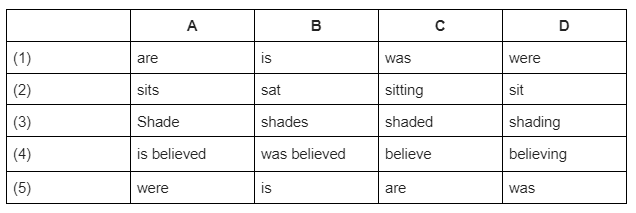
Answers
(1) B
(2) A
(3) C
(4) A
(5) B
C. Poon Lim, BEM _____ (1) a Chinese sailor who ______ (2) 133 day long ordeal in the South Atlantic alone. On November 23, 1942, during World War II, British merchant ship SS Ben Lomond, on which he _________ (3) as a second steward, _________(4) and torpedoed by a German U-boat some 750 miles east of the Amazon. As the ship was sinking, Poon Lim took a life jacket and_______(5) overboard before the ship’s boilers exploded.
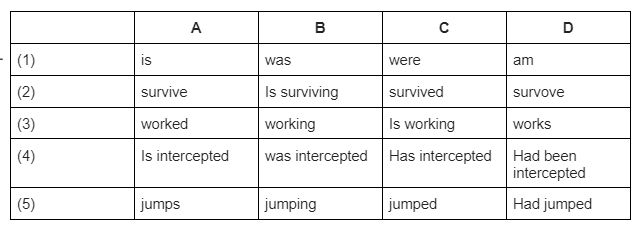
Answers
(1) B
(2) C
(3) A
(4) B
(5) C
D. The mountain garbage has assumed alarming proportions in the Himalayas with thousands of _____ (1) walking the hill tracks, floating down rivers and landing in tiny airfields in remote valleys _____ (2) them littered with plastics, _________ (3), discarded equipment, etc. No doubt, tourism has helped raise standards of living of the mountain people but ____________ (4) environment has suffered severely.

Answers
(1) C
(2) A
(3) A
(4) C
E. Newton __________ (1) one of the most brilliant thinkers of all times. Born on the Christmas ______ (2) of 1642 in the village of Woolsthorpe, Lincolnshire, England, he _________ (3) Gratham school. He was an idler at school, showing no inclination towards classical education. He was, however, very good at Mathematics. After ________ (4) from the Trinity college, Cambridge, he __________ (5) a Fellow in 1667 and then succeeded Prof. Issac Barrow as the Professor of Mathematics in 1669.
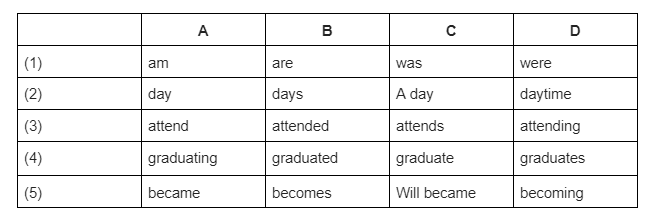
Answers
(1) C
(2) A
(3) B
(4) A
(5) A
Additional Resources on Tenses
- Tenses Examples | Types of Tenses in English Grammar with Examples
- Tenses MCQs for Class 10, 9, 8, 11 | Tenses MCQ Test Question
- Tenses in Hindi काल, काल की परिभाषा, भेद और उदाहरण
- Tenses for class 9 | Types of Tenses with Examples
- Master Tenses Rules, Examples in Hindi with Ruchika Ma’am English Academy
Important Tenses MCQs – Video
Also See:
- Determiners for Class 8 Rules, Exercises
- Modals for Class 8 use, examples, exercises
- Class 8 Subject Verb Agreement, Examples, Exercise
- Reported Speech for Class 8 English Grammar
- Exercises on Tenses Rules (True or False), Tenses Exercises